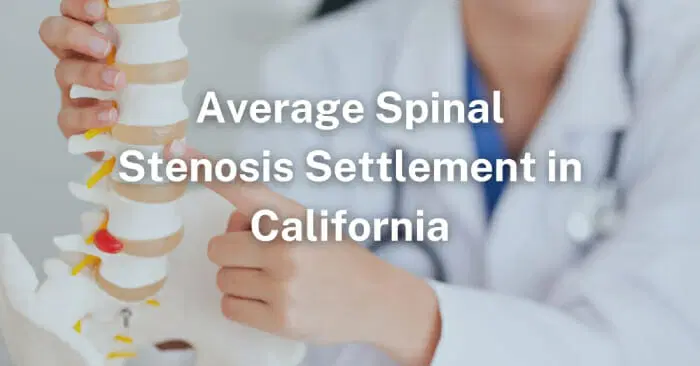
Average Spinal Stenosis Workers’ Comp Settlement in California
Legally reviewed by: Jessica Anvar Stotz, JD, MBA
Short Answer: We have seen and heard of various spinal stenosis settlements in California that settle for tens of thousands of dollars to millions.
Each case is different with multiple factors affecting the final settlement amount. If you want to get an accurate estimate on your potential settlement, you should speak with a qualified attorney.
Common Factors That Affect Spinal Stenosis Settlement Amount
Below is a list of common factors which can affect the settlement you are seeking:
Medical Expenses
In your settlement, a significant portion will cover reimbursement for past and future medical bills. Any expenses you incurred to alleviate your symptoms may be eligible for compensation. Below are a few examples:
- Paying for a doctor’ visit
- Physical therapy
- X-rays
- MRIs
- Surgery
- Chiropractic care
- Prescription medications
- Steroid injections
- Decompression procedures
This list is not exhaustive. If you have other procedures that give you relief, those can be worked into settlement amounts. Insurance companies will do whatever they can to leave some of these out, but our attorneys fight for every possible dollar.
Calculate Your Settlement Now
Use our online settlement calculator to get an approximate settlement estimate of your spinal stenosis injuries in 90 seconds or less.
How Spinal Stenosis Affects Everyday Life
Spinal stenosis goes beyond your medical bills. This type of injury can affect your life for long periods of time. Because of these ramifications, your settlement amount will account for these types of life changing injuries. Here are a few uncommon factors a settlement can help cover:
- Mental health
- Quality of life
- Ability to work
- Hours one can work
- Living independently
- Relationships with family and children
This list is not exhaustive. We will gather as much information and evidence as possible to help you and your loved ones secure a favorable settlement.
Mobility and Pain Levels Due to the Diagnosis
According to the Mayo Clinic, spinal stenosis can have an impact on the lower back (lumbar canal stenosis) or in the neck (cervical spinal stenosis), leading to nerve compression in those areas.
If the lumbar area is affected, it can result in pain and numbness from the lower back to the legs, potentially affecting standing-intensive jobs.
Cervical spinal stenosis can cause issues in the hands, arms, feet, or legs, and in severe cases, even impact bowel or bladder function, according to the Mayo Clinic. These symptoms can not only disrupt work but also daily activities at home.
All of these consequences can contribute to higher compensation in your settlement. It is important to receive financial support to address the challenges associated with spinal stenosis and to be appropriately compensated for the impact this injury has caused.
Other Factors That Can Increase Settlement Amounts
Since each case is different, below are a few other factors we see in these types of cases:
- Injury length
- Age
- Dependents
- Physical health
- Hobbies
- Career
Timing is Key
Seeking immediate medical attention after a work accident is crucial for several reasons. Firstly, it ensures that any injuries are promptly assessed and treated, reducing the risk of complications or further damage.
Early medical intervention can also alleviate pain and discomfort, promoting a quicker recovery. Additionally, documenting injuries through medical records obtained at the time of the accident strengthens any potential workers’ compensation claim.
Being able to pursue damages does not start on the day of your first treatment, it starts on the day of the accident. The further you wait to address your injury, the harder it can be to maximize settlement amount.
How Will You Know If You Have Spinal Stenosis?
If you suspect you might have spinal stenosis, it is important to consult with a medical professional for a proper diagnosis. They will consider your medical history, conduct a physical examination, and may recommend further diagnostic tests. Here are some common signs and symptoms associated with spinal stenosis according to Johns Hopkin Medicine:
- Pain or numbness: You may experience pain, tingling, or numbness in your back, neck, arms, or legs. These symptoms may worsen while walking or standing and improve when sitting or leaning forward.
- Weakness: Muscle weakness in the extremities, such as the arms or legs, can occur due to nerve compression.
- Balance and coordination issues: Spinal stenosis can lead to problems with balance and coordination, resulting in difficulty walking or a tendency to stumble.
- Bladder or bowel dysfunction: In severe cases, spinal stenosis may cause bladder or bowel problems, such as incontinence or difficulty with urination or bowel movements.
If you are experiencing any of these symptoms or have concerns about spinal stenosis, it is advisable to seek medical attention for a comprehensive evaluation and diagnosis.

Frequently Asked Questions
Below are common questions we hear and see about spinal stenosis:
Can I go back to work with spinal stenosis?
Whether or not you can go back to work with spinal stenosis depends on the severity of your condition, the nature of your job, and the recommendations of your healthcare provider. Spinal stenosis can range from mild to severe, and the impact on your ability to work will vary accordingly.
If your spinal stenosis is mild and well-managed with conservative treatments such as physical therapy, pain medication, or lifestyle modifications, you may be able to continue working with certain accommodations or adjustments. These could include ergonomic changes to your workspace, taking frequent breaks, or modifying your tasks to reduce strain on your back.
However, if your spinal stenosis is severe and significantly impairs your mobility, causes severe pain, or affects your ability to perform essential job functions, your healthcare provider may recommend temporary or permanent work restrictions or even suggest a career change.
Is spinal stenosis a long term disability?
Spinal stenosis can potentially result in long-term disability, although the extent and duration of disability can vary from person to person. The impact of spinal stenosis on an individual’s ability to work and perform daily activities depends on factors such as the severity of the condition, the effectiveness of treatment, and individual circumstances.
In some cases, individuals with spinal stenosis may experience ongoing symptoms and limitations that make it challenging to engage in regular work activities.
They may require accommodations or modifications to their work environment to continue working. In more severe cases, where conservative treatments do not provide sufficient relief, individuals may face long-term disability that hinders their ability to work and perform daily tasks.
It’s important to note that disability evaluations and determinations are typically made on a case-by-case basis, taking into account medical evidence, functional limitations, and the impact on an individual’s ability to work. Consulting with a healthcare provider and, if necessary, a disability specialist can provide further insights into your specific situation and help navigate the disability evaluation process.
What happens if you don’t fix spinal stenosis?
If left untreated, spinal stenosis can potentially lead to worsening symptoms and complications. While the progression of the condition can vary from person to person, here are some potential consequences of untreated spinal stenosis according to the Minnesota Spine Institute:
- Increased pain and discomfort: Spinal stenosis can cause chronic pain in the affected area, which may become more severe over time. This can significantly impact your quality of life and ability to perform daily activities.
- Nerve damage: The narrowing of the spinal canal in spinal stenosis can put pressure on the spinal nerves. If left untreated, this pressure can lead to nerve damage, resulting in persistent numbness, weakness, or loss of sensation in the extremities.
- Reduced mobility and function: As spinal stenosis progresses, it can impair your ability to walk, stand, or maintain balance. This can limit your mobility and independence, making it challenging to engage in normal activities.
- Impact on bowel and bladder function: In severe cases, untreated spinal stenosis can lead to complications with bowel and bladder function. This may result in issues such as incontinence or difficulty with urination or bowel movements.
- Permanent disability: In some instances, untreated spinal stenosis can lead to long-term disability, making it difficult or impossible to work or perform routine tasks.
Timely diagnosis and appropriate treatment can help manage symptoms, slow down the progression of the condition, and prevent potential complications.
Treatment options may include medication, physical therapy, lifestyle modifications, or in some cases, surgery. Your healthcare provider can guide you on the most suitable course of action based on your specific condition.
Get Connected with a Workers’ Comp Lawyer Today
If you’re looking to get connected with some of the best workers’ comp attorneys in California, give LawLinq a call. We are frequently vetting attorneys across the state to help people like you get their lives back on track.
The best part about our service is that it’s completely free. That’s right, lawyer referral services are completely free for anyone looking for a California attorney.
If you have questions or concerns about your case, reach out today to get them answered and to be one step closer to a settlement check in your hand.


